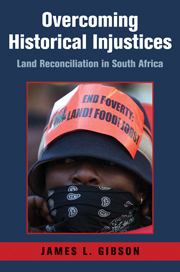Book contents
- Frontmatter
- Contents
- List of Figures
- List of Tables
- Preface and Acknowledgments
- 1 Land Reconciliation and Theories of Justice, Past and Present
- 2 Naming, Blaming, and Claiming on Historical Land Injustices: The Views of the South African People
- 3 Group Identities and Land Policy Preferences
- 4 Applied Justice Judgments: The Problem of Squatting
- 5 Judging the Past: Historical versus Contemporary Claims to Land
- 6 Land Reconciliation and Theories of Justice
- Appendix A A Note on Race in South Africa
- Appendix B The Survey Methodology
- Appendix C The Questionnaire
- References
- Index
- CAMBRIDGE STUDIES IN PUBLIC OPINION AND POLITICAL PSYCHOLOGY
3 - Group Identities and Land Policy Preferences
Published online by Cambridge University Press: 27 July 2009
- Frontmatter
- Contents
- List of Figures
- List of Tables
- Preface and Acknowledgments
- 1 Land Reconciliation and Theories of Justice, Past and Present
- 2 Naming, Blaming, and Claiming on Historical Land Injustices: The Views of the South African People
- 3 Group Identities and Land Policy Preferences
- 4 Applied Justice Judgments: The Problem of Squatting
- 5 Judging the Past: Historical versus Contemporary Claims to Land
- 6 Land Reconciliation and Theories of Justice
- Appendix A A Note on Race in South Africa
- Appendix B The Survey Methodology
- Appendix C The Questionnaire
- References
- Index
- CAMBRIDGE STUDIES IN PUBLIC OPINION AND POLITICAL PSYCHOLOGY
Summary
The overarching theory employed in this research has to do with how individuals relate to groups. Social Identity Theory (SIT) has been developed over the past several decades to explain these group attachments. The essential insights of the theory are that:
People receive psychological value from associating themselves with groups.
Group identities come to shape how people view the world.
Group identities can lead to concerns for fellow members of one's group that extend beyond acquaintances. Group identities can also connect individuals to group histories.
These sociotropic concerns for group justice structure how people perceive and act on issues such as land reconciliation.
The purpose of this chapter is to provide an overview of this theory and to examine the survey evidence on the ways in which South Africans identify with groups. Most important, I test the hypothesis that land policy preferences reflect these group identities. In the end, it seems that policy preferences reflect symbolic considerations associated with groups more than they reflect individual-level instrumentalism, and this is especially so among those who adopt particular types of group identities.
IDENTITIES AND GROUP HISTORY
Attitudes, beliefs, and actions regarding land issues are likely shaped by at least two major forces. On one hand, land preferences may reflect individual self-interests. Those who suffered from land policies of the past may simply seek restorative justice: the righting of the wrong that they experienced. In addition, those without land today may, whatever their histories, seek redistributive justice: land on which to live and work.
- Type
- Chapter
- Information
- Overcoming Historical InjusticesLand Reconciliation in South Africa, pp. 86 - 131Publisher: Cambridge University PressPrint publication year: 2009



